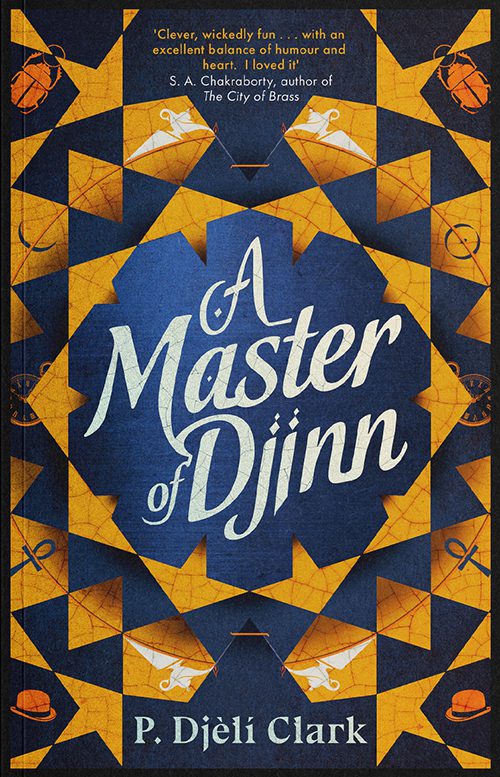
Synopsis
Cairo, 1912: Though Fatma el-Sha’arawi is the youngest woman working for the Ministry of Alchemy, Enchantments and Supernatural Entities, she’s certainly not a rookie, especially after preventing the destruction of the universe last summer.
So when someone murders a secret brotherhood dedicated to one of the most famous men in history, al-Jahiz, Agent Fatma is called onto the case. Al-Jahiz transformed the world forty years ago when he opened up the veil between the magical and mundane realms, before vanishing into the unknown. This murderer claims to be al-Jahiz, returned to condemn the modern age for its social oppressions. His dangerous magical abilities instigate unrest in the streets of Cairo that threaten to spill over onto the global stage.
Alongside her Ministry colleagues and a familiar person from her past, Agent Fatma must unravel the mystery behind this imposter to restore peace to the city―or face the possibility he could be exactly who he seems…
Review
An agent of supernatural oddities finds herself in the midst of a mystery that threatens to unravel the fabric of Cairo, facing off against djinn, ghuls and all matter of fearsome creatures in the process.
There’s something truly special about finding a novel that speaks to you, the words flowing from page to mind in a symbiotic creative fusion. That feeling of connecting so deeply with a book is priceless, something to be cherished, and it’s even better when that book becomes an author. For me, that author is P. Djèlí Clark. Ever since reading his short works A Dead Djinn in Cairo and The Haunting of Tram Car 015, I was enamored with his blending of the fantastical and historical. That connection deepened when I read some of his short stories, and then even more when I tore through last year’s Ring Shout. Count me lucky when his first full-length novel comes out a mere seven months later—in A Master of Djinn, Clark’s magically-infused Cairo is back and better than ever.
Set shortly after A Dead Djinn in Cairo and The Haunting of Tram Car 015, A Master of Djinn does an excellent job of establishing its setting and characters without getting bogged down in worldbuilding. Of course, there are a ton of satisfying references to its prequel novellas, but this story kicks off with a gripping murder mystery that immediately digs into the heart of colonial history. Taking place in Cairo in 1912, this is an Egypt and a world both familiar and unfamiliar to the one we live in: many decades prior, a man named al-Jahiz opened a portal to another dimension, bringing magic back into the world in ways both fantastical and devastating. Magic leaked into our world, in the shape of goblins in Germany, daeva in the Middle East, djinn in Egypt and much more—the very fabric of societies, governments, geopolitics and more was reshaped, and Egypt, instead of becoming a pawn on the colonial chessboard, was provided the opportunity to surpass its colonizers.
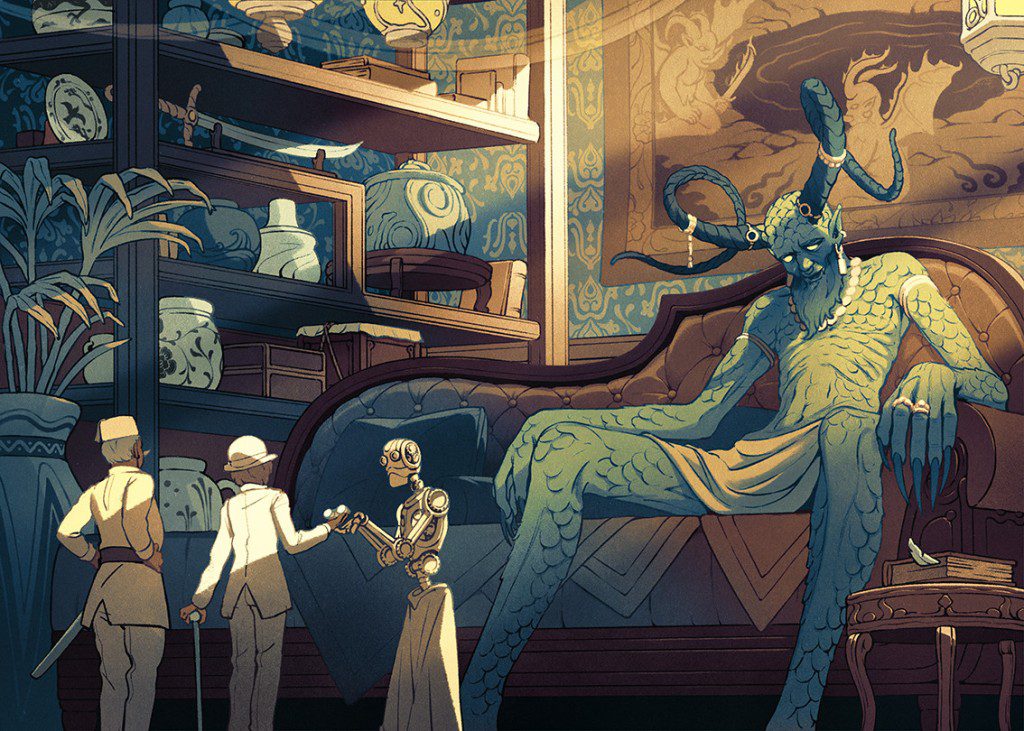
This fascinating premise instantly gripped me, from the trickles of worldbuilding in A Dead Djinn to the robustness of the novel-length A Master of Djinn. The latter is helped even more by bringing the protagonist Fatma el-Sha’arawi forward from that first novella to this novel and fleshing her out in rewarding ways. She provides the context for the world around her, and even though she works for the Ministry of Alchemy, Enchantments and Supernatural Entities, there is still so much that can surprise even her that as a reader the surprises are that much more gratifying.
Framing the story through Fatma provides a unique lens to view a unique world, where magical djinn run businesses, strange creatures surface and electric tram cars crisscross the skies. Fatma is also an outsider: queer, dressed in English suits, an applauded agent who defeated an Angel. On top of that, she’s flawed, carrying a weight of arrogance (a decorated female who fought through a man’s world) that often bites her in the ass. I really like this about her, ‘cause it shows how hard she had to grind to get where she is, but that doesn’t mean she wasn’t bruised or jaded along the way. If anything, it makes her more relatable and genuine, with a tinge of ego but not enough to make her an asshole. Still, at times, she underestimates the abilities of others, who turn it around to display their competence and aid Fatma in her investigation.
And what an investigation! I adore a good mystery, and Clark set this one up with Agatha Cristie-like suave. All of the clues are planted in ways both subtle and subversive, and there are plenty of twists and red herrings to lead you astray. All the while, the narrative kept me hooked, pulling me along with just the right balance of pacing—character moments punctuated by action punctuated by investigating punctuated by the introduction of more clues. It’s wonderful and compelling and giddy in a way I’ve only felt reading mystery writers like Christie—there’s a sense of wonder and playfulness to the whole charade.
But Clark takes it a step beyond, using this mysterious murder to comment on and explore the political goings-on of Cairo at the time. The inklings of World War I loom, and the superpower nations of Europe are in Egypt—now an African superpower, thanks to magic—to discuss the geopolitical future of the developed world. Germany, Russia, the Ottoman Turks and more have gathered, and the murder of a secret brotherhood (comprised mostly of Brits) sends Cairo into turmoil. This historical backdrop is brought to life with finesse by Clark, who weaves rich details from history into the narrative without bogging it down. I appreciate the way he uses history as a flourish as opposed to being a crutch; A Master of Djinn wouldn’t fall apart without those details, but they bring a complexity to the world that makes it feel more alive. It’s also an effective way to challenge the colonial narrative of history by placing Cairo and Egypt in a position of power, with all the other superpowers going there, a sign that Egypt holds political weight and agency in the pre-WWI chessboard.
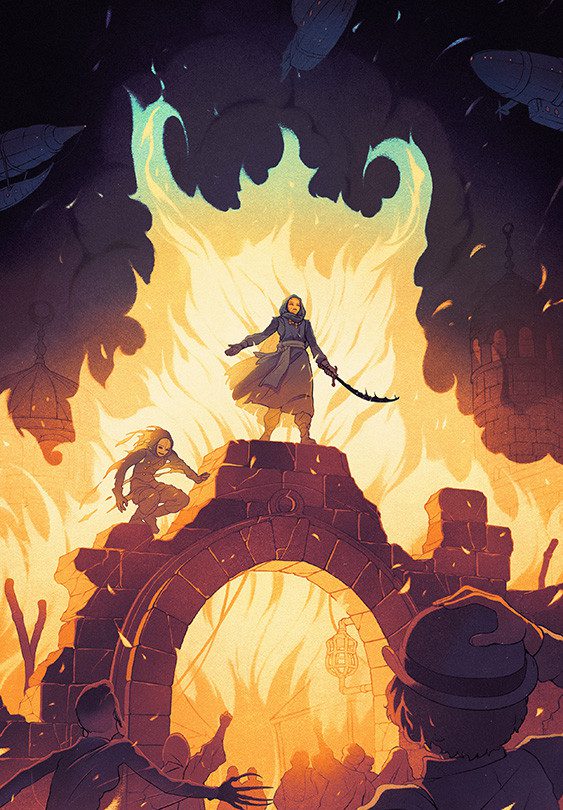
History also comes out in the world itself, Cairo being a verdant tapestry of intermingling cultures: djinn mix with native Egyptians in coffee- and tea-soaked cafes; Soudanese and Abyssinians ruffle kaftans in the bustling, shop-filled corridors; and even expat musicians from the American south fill smoky underground bars with the organized chaos of proto-jazz. From the food and drink to the clothes, architecture and more, it’s clear that Clark did his homework (he is a history professor after all) and enriched an already interesting setting with even more to entice. Add to that are the magical influences of djinn and other magical creatures, evident in the strange architectural styles, steampunk technology (including the aforementioned aerial trams) and more. It gives the city an atmosphere of foreign and familiar, wondrous and eerie, but all of it comes together to make Clark’s version of Cairo truly stand out.
The magic does more than just accentuate Cairo though—it acts as a poignant allegory for modern day issues of discrimination and racism. The population of djinn in Cairo, and various parts of northern Africa, are essentially refugees, taken from their world and brought into ours. They often find themselves misjudged, mistreated, even misused, in the sense that some djinns are literally bound by magic to owners. (The title of the book is A Master of Djinn after all, and that title is quite literal.) It’s not just the djinn too. There are populations of downtrodden Egyptians and human immigrants, pushed aside into ghettos, lacking the government aide, food, infrastructure and more necessary to survive. I found this to be a powerful message, one that resonates throughout the book and adds depth to the anti-colonial through line of the main narrative.
Overall, A Master of Djinn combines so many elements that I wasn’t sure it could maintain course and keep it all together—but Clark handles it well. Fatma is an excellent protagonist, with her own personal struggles and believable relationships. Best of all are her relationship with Siti, an alluring-yet-mysterious femme fatale with sharp claws and fierce loyalty, as well as Hadia, who plays the wide-eyed rookie to perfection but also has a competency and drive that can’t be beat. (Basically, she’s a badass and a great character.) There are also recurring characters from A Dead Djinn and Tram Car 015 that were incorporated beautifully. The apparent obviousness of the book’s villain also serves the story brilliantly, playing into the history of this world as well as the socioeconomic disparities of Cairo. (Could it be al-Jahiz returned? Will he save Cairo’s oppressed? Is it really true?) But, once the mystery unravels and the villain’s motivations are made clear, as much as I enjoyed how it plays out, I wanted just a bit more to those motivations and the history behind them.
That said, it’s a small gripe for what is otherwise an exceptional story. Brimming with appealing characters, gripping action, a damn good mystery, strange creatures and monsters, steampunk wonders and a Cairo that begs to be visited (move aside 1920s Paris), A Master of Djinn is a book I will recommend over and over again to anyone I can. With last year’s Ring Shout, P. Djèlí Clark cemented himself as a truly special voice in the fantasy genre. Now, with A Master of Djinn, that position is not only reaffirmed, it’s indisputable.
P.S. Click here to check out my two-part interview with P. Djèlí Clark.






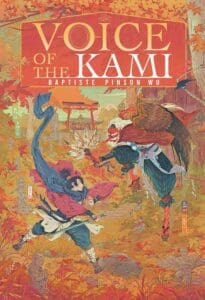
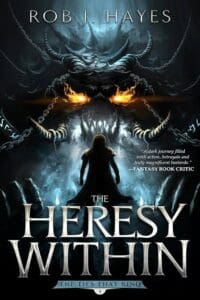

Leave a Reply